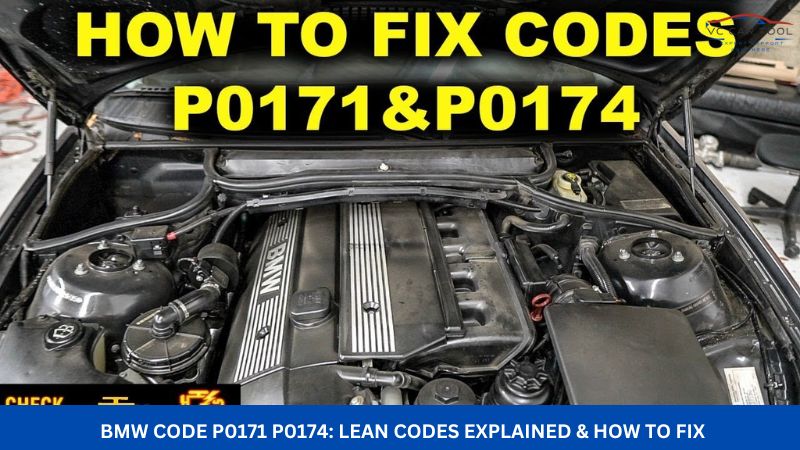BMW Code P0171 P0174: Lean Codes Explained & How to Fix
BMW code P0171 P0174 indicates a lean condition in engine bank 1 and bank 2, but you can resolve it by addressing the root cause, which often involves checking the mass air flow (MAF) sensor, vacuum leaks, or fuel delivery issues. Users are actively seeking solutions for these codes, and this guide offers expert insights into diagnosing and resolving them effectively. We’ll walk you through the common causes and step-by-step solutions to get your BMW running smoothly again.
If you’re unsure about repairing, diagnosing, or programming BMW code P0171 P0174, contact VCCarTool via WhatsApp: +1 (901) 414 – 1927 for assistance to avoid causing more serious errors.

1. Understanding BMW Code P0171 and P0174
BMW codes P0171 and P0174 signify that the engine’s air-fuel mixture is running lean on Bank 1 and Bank 2, respectively. A lean condition means there is too much air and not enough fuel in the mixture. This can lead to reduced engine performance, poor fuel economy, and potential damage to engine components if left unaddressed.
1.1. What Does a Lean Condition Mean?
A lean condition in your BMW means that the air-fuel ratio is skewed towards more air than fuel. Ideally, the air-fuel ratio should be around 14.7:1 (the stoichiometric ratio), but when it’s significantly higher, the engine runs lean. According to a study by the National Research Council, lean conditions can raise combustion temperatures, increasing the risk of overheating and potential engine damage.
1.2. Bank 1 vs. Bank 2
In a BMW engine, which is typically a multi-cylinder engine, “Bank 1” and “Bank 2” refer to different sets of cylinders. Bank 1 usually includes the cylinder that contains the number one spark plug. Bank 2 is the other bank. Identifying which bank is affected is crucial for pinpointing the source of the problem.
2. Common Symptoms of BMW Code P0171 P0174
Recognizing the symptoms associated with BMW codes P0171 and P0174 can help you diagnose the problem early and prevent further damage. Here are some common symptoms:
- Check Engine Light: The most obvious sign is the illumination of the check engine light on your dashboard.
- Rough Idle: The engine may idle roughly or stall, especially when cold.
- Poor Acceleration: You may notice a lack of power or hesitation when accelerating.
- Reduced Fuel Economy: A lean condition can cause the engine to work harder, leading to decreased fuel efficiency.
- Hesitation or Stumbling: The engine might hesitate or stumble during acceleration.
- Increased Emissions: A lean-running engine can produce higher levels of certain emissions, potentially causing you to fail an emissions test.
3. Potential Causes of BMW Code P0171 P0174
Several factors can cause a lean condition in your BMW. Here are some of the most common culprits:
- Mass Air Flow (MAF) Sensor Issues:
- Dirty or Faulty MAF Sensor: The MAF sensor measures the amount of air entering the engine. If it’s dirty or faulty, it can provide inaccurate readings, leading to a lean condition.
- Vacuum Leaks:
- Cracked or Disconnected Vacuum Hoses: Vacuum leaks allow unmetered air to enter the engine, disrupting the air-fuel ratio.
- Intake Manifold Gasket Leaks: A faulty intake manifold gasket can also cause vacuum leaks.
- Fuel Delivery Problems:
- Weak Fuel Pump: A failing fuel pump may not deliver enough fuel to the engine.
- Clogged Fuel Filter: A clogged fuel filter restricts fuel flow, causing a lean condition.
- Faulty Fuel Injectors: Dirty or failing fuel injectors may not spray fuel properly.
- Oxygen (O2) Sensor Issues:
- Failing O2 Sensors: Although less common, faulty O2 sensors can provide incorrect feedback to the engine control unit (ECU), leading to incorrect adjustments and a lean condition.
- Exhaust Leaks:
- Exhaust Manifold Cracks: Leaks in the exhaust system can affect O2 sensor readings, leading to a false lean condition.
- PCV Valve Problems:
- Stuck Open PCV Valve: A stuck-open PCV valve can introduce excess air into the intake manifold.
4. Step-by-Step Diagnostic Process for BMW Code P0171 P0174
Diagnosing BMW codes P0171 and P0174 requires a systematic approach to identify the root cause. Here’s a detailed step-by-step process:
4.1. Step 1: Read and Clear the Codes
Use an OBD-II scanner to read and record all diagnostic trouble codes (DTCs) stored in the ECU. Note down all the codes, as there may be other related issues. After recording the codes, clear them and take your BMW for a test drive to see if the P0171 and P0174 codes reappear.
4.2. Step 2: Inspect the Mass Air Flow (MAF) Sensor
- Visual Inspection: Check the MAF sensor for any visible signs of damage or contamination.
- Cleaning the MAF Sensor: Use a specialized MAF sensor cleaner to gently clean the sensor element. Reinstall the sensor and retest.
4.3. Step 3: Check for Vacuum Leaks
- Visual Inspection: Inspect all vacuum hoses for cracks, disconnections, or damage.
- Smoke Test: A smoke test can help locate vacuum leaks. Introduce smoke into the intake system and watch for smoke escaping from any leaks.
- DIY Vacuum Leak Test: You can use a can of carburetor cleaner or starting fluid to spray around vacuum lines and intake manifold gaskets. If the engine RPM changes when you spray a particular area, you’ve likely found a vacuum leak.
4.4. Step 4: Evaluate Fuel Delivery
- Fuel Pressure Test: Use a fuel pressure gauge to check if the fuel pump is delivering the correct pressure. Consult your BMW repair manual for the specified pressure range.
- Fuel Filter Inspection: Check the fuel filter for clogs or restrictions. Replace the filter if necessary.
- Fuel Injector Test: Use a multimeter to check the resistance of the fuel injectors. Compare the readings to the manufacturer’s specifications. You can also have the injectors professionally cleaned and tested.
4.5. Step 5: Examine Oxygen (O2) Sensors
- O2 Sensor Readings: Use an OBD-II scanner to monitor the O2 sensor readings. Look for any unusual or erratic behavior.
- Visual Inspection: Check the O2 sensors for any signs of damage or contamination.
4.6. Step 6: Inspect the Exhaust System
- Visual Inspection: Check the exhaust manifold and exhaust pipes for any cracks or leaks.
- Listen for Leaks: Start the engine and listen for any hissing or whistling sounds coming from the exhaust system.
4.7. Step 7: Check the PCV Valve
- Visual Inspection: Inspect the PCV valve and its hoses for any signs of damage or clogs.
- PCV Valve Test: Remove the PCV valve and shake it. If it doesn’t rattle freely, it may be stuck and need replacement.
5. Solutions for BMW Code P0171 P0174
Once you’ve identified the cause of the lean condition, you can take steps to resolve the issue. Here are some common solutions for BMW codes P0171 and P0174:
5.1. Cleaning or Replacing the MAF Sensor
- Cleaning: If the MAF sensor is dirty, clean it with a specialized MAF sensor cleaner.
- Replacing: If cleaning doesn’t resolve the issue, replace the MAF sensor with a new one. Ensure you use a high-quality replacement MAF sensor that is compatible with your BMW model. According to Bosch, using the correct MAF sensor ensures accurate air flow measurement, which is critical for proper engine operation. You can purchase a new MAF sensor from VCCarTool today! Contact us via WhatsApp: +1 (901) 414 – 1927 for assistance.
5.2. Repairing Vacuum Leaks
- Replacing Hoses: Replace any cracked, damaged, or disconnected vacuum hoses.
- Replacing Gaskets: Replace any faulty intake manifold gaskets. Ensure the new gasket is properly installed and torqued to the manufacturer’s specifications.
5.3. Addressing Fuel Delivery Issues
- Replacing Fuel Pump: If the fuel pump is weak, replace it with a new one.
- Replacing Fuel Filter: Replace the fuel filter to ensure proper fuel flow.
- Cleaning or Replacing Fuel Injectors: Clean or replace any dirty or faulty fuel injectors. Consider having the injectors professionally cleaned and tested for optimal performance.
5.4. Replacing Oxygen (O2) Sensors
- Replacing O2 Sensors: If the O2 sensors are faulty, replace them with new ones. It’s often recommended to replace both pre-catalytic converter O2 sensors (Bank 1 Sensor 1 and Bank 2 Sensor 1) at the same time to ensure balanced performance.
5.5. Repairing Exhaust Leaks
- Welding or Replacing Exhaust Components: Repair any cracks or leaks in the exhaust manifold or exhaust pipes. If the damage is severe, consider replacing the affected components.
5.6. Replacing PCV Valve
- Replacing PCV Valve: If the PCV valve is stuck or damaged, replace it with a new one. Ensure the new PCV valve is properly installed and connected to its hoses.
6. Tools and Equipment Needed for Repair
To diagnose and repair BMW codes P0171 and P0174, you’ll need a variety of tools and equipment. Here’s a list of essential items:
- OBD-II Scanner: To read and clear diagnostic trouble codes.
- Multimeter: To test electrical components like fuel injectors and O2 sensors.
- Fuel Pressure Gauge: To check fuel pump pressure.
- Vacuum Leak Detector: A smoke machine or carburetor cleaner to find vacuum leaks.
- Socket Set and Wrenches: To remove and install various components.
- Screwdrivers: Both flathead and Phillips head screwdrivers.
- MAF Sensor Cleaner: To clean the MAF sensor.
- Protective Gear: Gloves and safety glasses.
7. Preventing Future Occurrences of BMW Code P0171 P0174
Preventing BMW codes P0171 and P0174 involves regular maintenance and proactive care. Here are some tips to keep your BMW running smoothly:
- Regular Maintenance: Follow the manufacturer’s recommended maintenance schedule, including oil changes, filter replacements, and spark plug replacements.
- Use Quality Fuel: Use high-quality fuel from reputable gas stations to prevent fuel system issues.
- Inspect Vacuum Hoses: Regularly inspect vacuum hoses for cracks or damage and replace them as needed.
- Clean MAF Sensor: Clean the MAF sensor every 20,000 to 30,000 miles to ensure accurate air flow readings.
- Monitor Engine Performance: Pay attention to any changes in engine performance, such as rough idling or reduced fuel economy, and address them promptly.
8. Estimated Costs for Repairs
The cost to repair BMW codes P0171 and P0174 can vary depending on the cause and the parts needed. Here are some estimated costs for common repairs:
| Repair | Estimated Cost |
|---|---|
| MAF Sensor Replacement | $150 – $300 |
| Vacuum Leak Repair | $50 – $200 |
| Fuel Pump Replacement | $300 – $600 |
| Fuel Filter Replacement | $50 – $150 |
| Fuel Injector Cleaning | $100 – $300 |
| O2 Sensor Replacement | $100 – $300 |
| Exhaust Leak Repair | $100 – $500 |
| PCV Valve Replacement | $50 – $150 |
Note: These costs are estimates and may vary based on your location and the specific parts used.
9. Why Choose VCCarTool for Your BMW Diagnostic Needs?
At VCCarTool, we understand the complexities of diagnosing and repairing modern vehicles, especially high-performance BMWs. Our team of experienced technicians and engineers are dedicated to providing top-notch diagnostic services, cutting-edge tools, and comprehensive support to help you resolve even the most challenging issues.
9.1. Expert Diagnostic Services
Our diagnostic services are designed to quickly and accurately identify the root cause of your BMW’s problems. We use advanced diagnostic equipment and techniques to ensure that you receive the most precise and reliable results. Whether you’re dealing with a simple check engine light or a complex engine issue, we have the expertise to get you back on the road.
9.2. Cutting-Edge Tools and Software
VCCarTool offers a wide range of high-quality tools and software to assist you in diagnosing and repairing your BMW. From OBD-II scanners to specialized programming tools, we have everything you need to tackle any automotive challenge. Our products are sourced from trusted manufacturers and are rigorously tested to ensure performance and reliability.
Need help selecting the right tools for your specific needs? Contact us via WhatsApp: +1 (901) 414 – 1927 for expert advice and personalized recommendations.
9.3. Comprehensive Support
We believe in providing more than just products and services – we offer comprehensive support to ensure your success. Our team is available to answer your questions, provide technical assistance, and guide you through the diagnostic and repair process. With VCCarTool, you’re never alone.
9.4. Remote Diagnostic Assistance
Facing a tough diagnostic challenge? Our remote diagnostic assistance service connects you with our experienced technicians who can remotely access your vehicle’s diagnostic data and provide real-time guidance. This service is perfect for complex issues or when you need a second opinion.
9.5. Customer Satisfaction
At VCCarTool, customer satisfaction is our top priority. We are committed to providing exceptional service and support to ensure that you are completely satisfied with your experience. Our dedication to excellence has earned us a reputation as a trusted partner in the automotive industry.
10. Real-World Case Studies
Here are a couple of real-world case studies illustrating how BMW codes P0171 and P0174 were diagnosed and resolved:
10.1. Case Study 1: 2015 BMW 328i (F30) with P0171 and P0174
- Symptoms: Check engine light, rough idle, and reduced fuel economy.
- Diagnosis: Using an OBD-II scanner, codes P0171 and P0174 were confirmed. A smoke test revealed a vacuum leak at the intake manifold gasket.
- Solution: The intake manifold gasket was replaced, and the codes were cleared. After a test drive, the engine ran smoothly, and the fuel economy improved.
- Tools Used: OBD-II scanner, smoke machine, socket set, and torque wrench.
10.2. Case Study 2: 2012 BMW X5 50i (E70) with P0171 and P0174
- Symptoms: Check engine light, hesitation during acceleration, and poor performance.
- Diagnosis: Codes P0171 and P0174 were identified. The MAF sensor readings were erratic.
- Solution: The MAF sensor was replaced with a new Bosch unit. The codes were cleared, and the engine performance was restored.
- Tools Used: OBD-II scanner, multimeter, socket set, and MAF sensor cleaner.
11. Customer Testimonials
Here’s what some of our satisfied customers have to say about VCCarTool:
- John S., BMW Technician: “VCCarTool has been an invaluable resource for my shop. Their diagnostic tools are top-notch, and their support team is always ready to help. Thanks to VCCarTool, we can diagnose and repair BMWs with confidence and efficiency.”
- Mike R., DIY Enthusiast: “I was struggling to diagnose a P0171 code on my BMW until I found VCCarTool. Their diagnostic guides and expert advice helped me pinpoint the problem and fix it myself. I highly recommend VCCarTool to any BMW owner.”
- Sarah K., Garage Owner: “VCCarTool has transformed our garage’s capabilities. Their comprehensive diagnostic solutions and outstanding customer support have enabled us to provide superior service to our clients. VCCarTool is a game-changer for our business.”
12. Contact VCCarTool for Assistance
If you’re experiencing BMW codes P0171 and P0174 and need assistance, don’t hesitate to reach out to VCCarTool. Our team of experts is here to help you diagnose and resolve your BMW’s issues quickly and efficiently.
Contact us today through the following channels:
- WhatsApp: +1 (901) 414 – 1927
- Email: [email protected]
- Website: vccartool.com
We’re committed to providing you with the best diagnostic solutions and support to keep your BMW running at its peak performance.
13. FAQs About BMW Code P0171 P0174
13.1. What does BMW code P0171 mean?
BMW code P0171 indicates that Bank 1 of your engine is running too lean, meaning there is too much air and not enough fuel in the air-fuel mixture.
13.2. What does BMW code P0174 mean?
BMW code P0174 indicates that Bank 2 of your engine is also running too lean, mirroring the condition in Bank 1.
13.3. Can I drive my BMW with codes P0171 and P0174?
It’s not recommended. Driving with a lean condition can cause engine damage over time. It’s best to diagnose and fix the problem as soon as possible. Contact VCCarTool via WhatsApp: +1 (901) 414 – 1927 for assistance.
13.4. How do I fix a lean code on my BMW?
Start by checking the MAF sensor, looking for vacuum leaks, and inspecting the fuel system. Refer to the step-by-step diagnostic process in this guide, or contact VCCarTool for expert assistance.
13.5. Will a bad O2 sensor cause a P0171 code?
Yes, a faulty O2 sensor can provide incorrect feedback to the ECU, leading to incorrect adjustments and a lean condition, triggering a P0171 code.
13.6. Can a dirty MAF sensor cause a lean code?
Yes, a dirty or faulty MAF sensor can provide inaccurate readings, leading to a lean condition and triggering codes P0171 and P0174.
13.7. How often should I clean my MAF sensor?
It’s recommended to clean your MAF sensor every 20,000 to 30,000 miles, or as part of your regular maintenance schedule.
13.8. Can a vacuum leak cause BMW codes P0171 and P0174?
Yes, vacuum leaks allow unmetered air to enter the engine, disrupting the air-fuel ratio and leading to a lean condition, triggering codes P0171 and P0174.
13.9. What is the ideal air-fuel ratio for a BMW engine?
The ideal air-fuel ratio for a BMW engine is around 14.7:1, also known as the stoichiometric ratio.
13.10. Where can I find reliable diagnostic tools for my BMW?
VCCarTool offers a wide range of high-quality diagnostic tools and software for BMWs. Contact us via WhatsApp: +1 (901) 414 – 1927 for expert advice and personalized recommendations.
By understanding the causes, symptoms, and solutions for BMW codes P0171 and P0174, you can keep your BMW running smoothly and efficiently. Remember, regular maintenance and proactive care are key to preventing these issues in the first place. If you need assistance, VCCarTool is always here to help.

 Combo Master WinOLS Manual: Complete ECU Tuning System for Petrol & Diesel Engines
Combo Master WinOLS Manual: Complete ECU Tuning System for Petrol & Diesel Engines